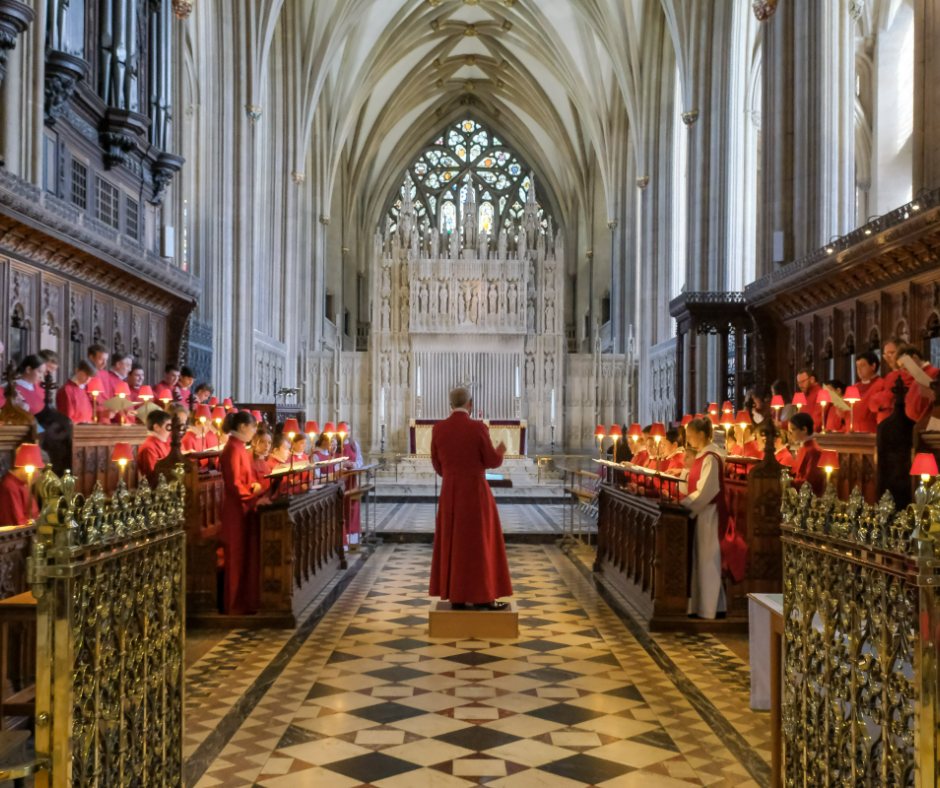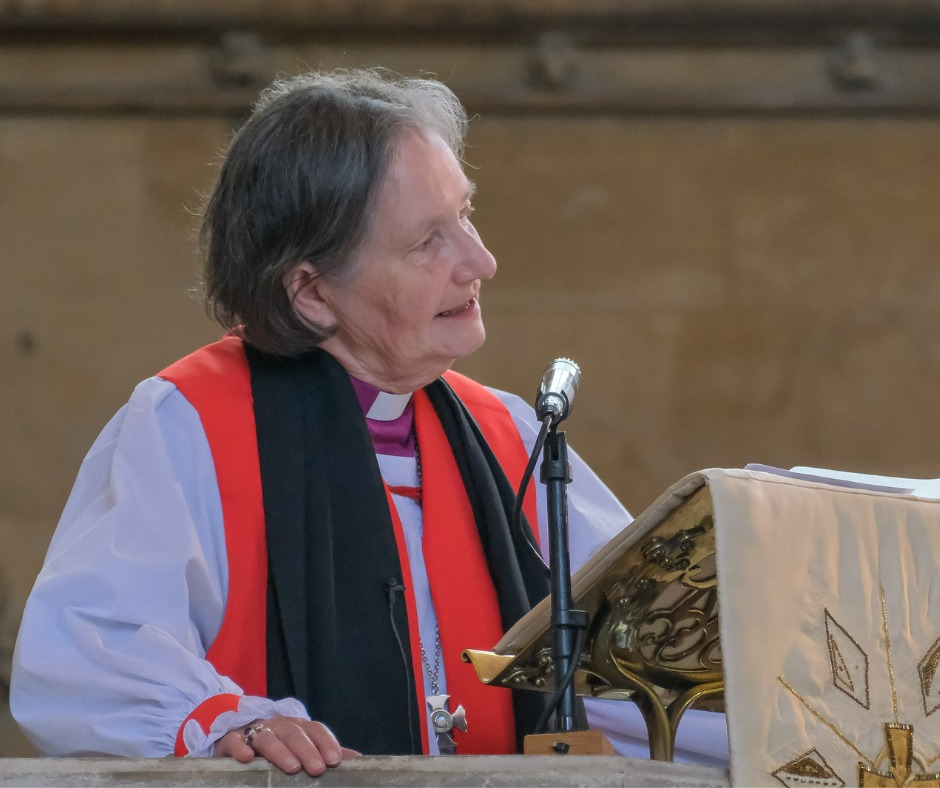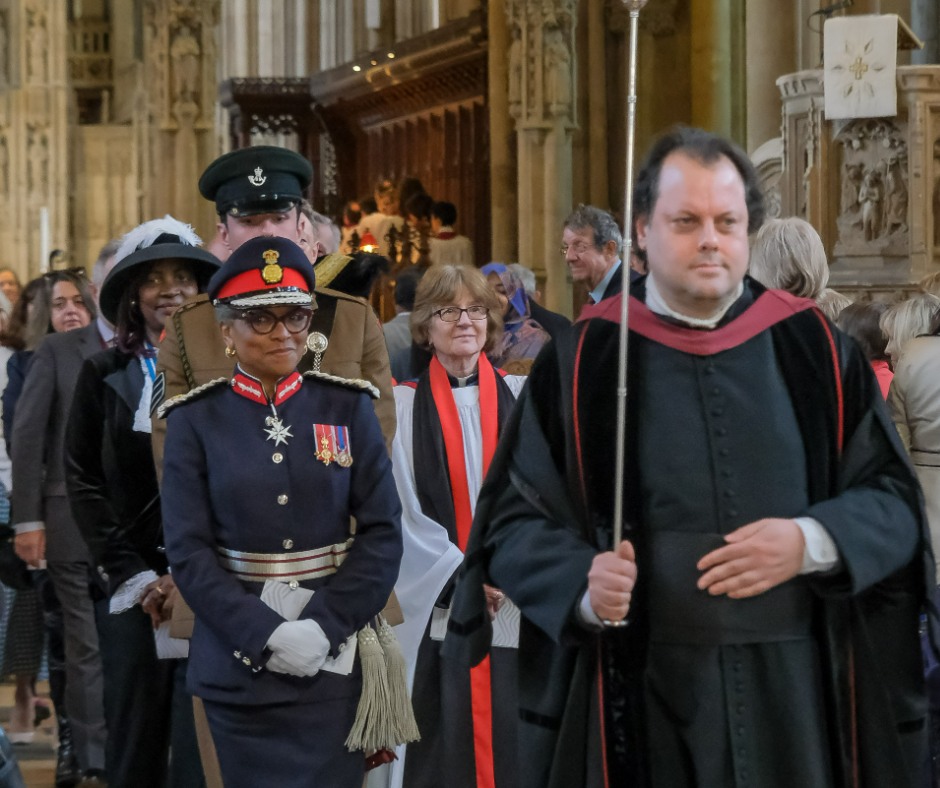A Coronation Evensong service took place on Sunday 8 May at Bristol Cathedral, to mark the coronation of King Charles III.
The service brought together singers from St George’s Bristol and choirs across the city to perform the great coronation anthem, Zadok the Priest.

The Very Revd Dr Mandy Ford, Dean of Bristol said:
"I hope the singers had an extraordinary experience singing together in Bristol Cathedral and it is a real joy to know that the resulting film will convey our prayers and congratulations to His Majesty on his Coronation."
Bishop Viv attended the service, giving a powerful sermon, which follows:
The Diocese of Bristol is possibly not amongst the most fervently royalist in the realm. Though my own Bristolian grandparents camped out overnight in the Mall before Queen Elizabeth’s coronation and were joined by my mother and her then fiancé who, for reasons never established, brought a tennis racquet with him. The police were able then to look benignly on a young fervent Cornishman.
Our own context is very different.
I was in conversation recently with the head of an international aid agency who, perhaps unsurprisingly from his perspective, talked of the multiple crises affecting our world, from war to the climate and ecological breakdown, from earthquake to pandemic, he talked of what the Aid Agencies are terming permacrisis. It is in that context that I place the coronation, the demands on our Head of State, King Charles 111, our thanksgiving for his, and the Queen’s coronation, our calling individually and together to pray for him and to lead the communities of this city and diocese in doing so, and our calling to participate in considering how our governance should continue to develop.
Our scriptures do not offer a clear doctrine of monarchy. As a backdrop to Jesus’ ministry neither Caesar nor Herod are treated warmly by the gospel writers. Going back into the Hebrew scriptures, for the prophets, the campaign for monarchy to be created was a sign of failure to keep the covenant between the Lord God and God’s people and a disregard of the word and work of the judges. What had been the particular gift of the people of Israel…. to have the Lord God as their only ruler was to be sacrificed under the threat of the Philistines, to keep up with neighbouring peoples who did not worship the one true God.
But for us, by contrast, for nearly all of our national history we have lived in a monarchy, with an evolving understanding of what that means, but a constant understanding of that monarchy providing stability, continuity and organic development under God.
And, in a nation without a written constitution, for the monarch to be understood as Bishop James Jones puts it, as making visible our unwritten constitutional arrangements. As we saw yesterday.

The coronation yesterday was, as it has been for more than 1000 years, a service of word and sacrament within which the texts and symbols spelt out the duty of the monarch
- That the scriptures were to be the King’s inspiration and guide
- That he was anointed, as priests and prophets are, for holiness
- That he is to minister justice, restore what was corroded, protect the church and people
- That he is to fashion his life on that of Christ
- And that life of faithful duty was to be offered as an anticipation of a heavenly future.
That is the demanding calling of monarchy which many of us understand as a particular version of the call to Christian discipleship. And I believe we saw the seriousness of that vocation etched on the king’s face, and felt its demands as he knelt in prayer before his anointing wearing a simple shift.
And the ritual, music, participation set out the context for this discipleship with great clarity.
In a nation where fewer than half, according to the 2021 census, own the description of Christian and in which many of those Christians are unfamiliar with the rites and ceremonies of the Church of England, there is space and a need for the development of a broader understanding of monarchy which whilst Christian to its core, can be more capacious in our multi faith, and agnostic and secularising context. We saw that in the participation of representatives of a range of denominations and faiths, of faith leaders, and also those who themselves bear responsibility for our nation in the House of Commons and my colleagues in the House of Lords. The themes of the service spoke into that wider context.
In his first broadcast words as king, Charles 111, rather than demanding our allegiance, spoke of serving all his peoples with loyalty, respect and love. And so the Coronation service began with a chorister’s welcome:
Your majesty
As children of the kingdom of God
We welcome you in the name of the king of kings
And the King responded:
In his name and after his example
I come not to be served but to serve.
And then that moving personal prayer voiced by the King for perhaps the first time in history, the monarch praying so personally:
God of compassion and mercy
Whose son was sent not to be served but to serve
Give grace that I may find in thy service perfect freedom
and in that freedom knowledge of this truth.
Grant that I may be a blessing to all thy children, of every faith and conviction,
that together we may discover the ways of gentleness and be led into the paths of peace.
And that rightly predominant theme of service was played out in yesterday’s drama in the invitation to those from across our nation who do so serve, to be present as witnesses. And what of other implicit themes?
Immediately after the oaths, ceremonies the anointing and benediction and the proclamation, the king led the people in the offertory, giving the bread and wine to the Archbishop of Canterbury. His reign began with thanks to God offered in the eucharist. It will continue with thanksgiving to and for his people through letters and broadcasts, in garden parties and investitures. Over and over again the king will thank those whose own servant leadership maintains the bonds of peace in our nation. He will show that he understands that gratitude is the elixir which opens us up to each other and binds us together.
Solidarity is perhaps an odd word to use in the context of hierarchy implicit in monarchy, but more obvious in a context where politics is being depersonalized and people set against each other. The voicing of our allegiance to the king became somewhat contentious this week, but for those of us who do take oaths of allegiance we do so to a person, to His Majesty King Charles 111 and his heirs and successor. We don’t take oaths to a system. Or to a state. We take oaths to a sovereign who is (as we saw enacted yesterday, subject to God, played out visually as the king was enthroned not facing the people, but facing the altar). Royal power is penultimate and to be wielded for God’s purposes of justice and mercy. We have already heard some of that orientation towards the overlooked and weak from Charles 111 and I expect to hear more.
Service, thanksgiving, solidarity…and a final additional theme comes from the floor of Westminster Abbey itself, from the Cosmati pavement which was the King’s footstool yesterday. The pavement is an extraordinary piece of 13th century craftwork and theology in art which sets the royal throne at the heart of the drama of creation. It is as if the monarch is not just the unifier of nations, but of our planet and other planets, of fire and air and water and earth. Perhaps this theme, of the unifier not just of peoples, but of the cosmos, is one in which King Charles 111 will feel particularly at home given his pioneering conservation and transformation conviction.
Service, thanksgiving, solidarity, unifier of creation, each of these redolent in Christian theology of the work of the Christ who serves us, who gives thanks to his father, who gathers all people and the whole of creation and who offers new life to the world. And for the centuries of our nation, service, thanksgiving, solidarity, restoration and reunification have been values which have enabled all our wonderfully diverse peoples to thrive.

As Charles III seeks to serve us and out crisis-ridden world we do pray for him is his demanding vocation
In the words of Psalm 72, sung by the eastern orthodox choir, pray:
Give the king your justice O God
And your righteousness to a king’s son
May he judge your people with righteousness
And your poor with justice
May the mountains yield prosperity for the people
And the hills in righteousness.
May he deferent the cause of the poor of the people
Give deliverance to the needy
And crush the oppressor
May he live while the sun endures…
In his days may righteousness flourish and peace abound
Until the moon is no more.
May God indeed save the King